The Libraries empowers campus users to be active learners and critical thinkers. To support student success, we commit to providing the unique and equitable resources, tools, and spaces necessary for teaching and learning across the disciplines. We strive to support the diverse needs of our users and to contribute to the academic success of each student, both at the undergraduate and graduate levels.
Enrich the student experience and increase student success
Access Services and Research and Instructional Services (RIS)
Information sharing by Access Services and RIS in Core Writing program, Webcampus
Access Services collaborated with the Libraries' RIS department to ensure Access Services' information is covered in Webcampus, specifically the Department of English's Core Writing program, ENG 102. Topics covered included printing, finding books, reserves, and equipment.
The RIS department's Core Writing module in Canvas well represents Access Services information. Overall, equipment checkout has increased nearly 12 percent from the previous fiscal year and is on track for another increase in calendar year 2025.
@One
Implementing student success and experience surveys
The @One department investigated and implemented student experience and success surveys in calendar year 2024. Areas of survey implementation included but were not limited to Alma-linked surveys for checkout, and QR code surveys in the @One department for general computing, printing and specialty spaces. QR code surveys were posted outside of each of the @One department's specialty rooms, as well as outside of the Multimedia Specialists office located within the @One on the first floor of the Mathewson-IGT Knowledge Center. Additionally, a customer survey was created for the @One's Lendable Technology department.
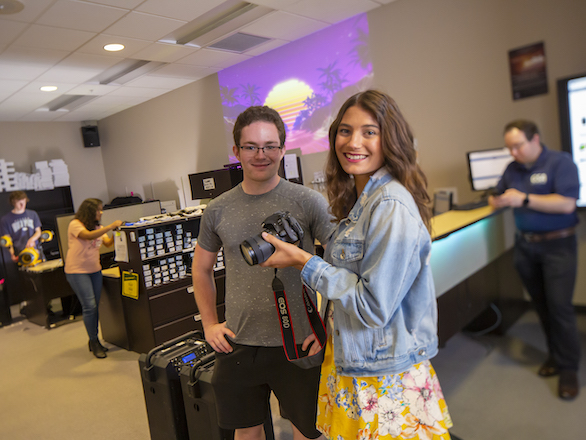
Diminishing technology barriers and training bottlenecks
The @One department diminished technology barriers and training bottlenecks, while simultaneously enhancing student access to its specialty spaces: Mastering Suite, Sound Studio, Podcast Suite, and Self-Serve Studio.
To achieve this, the team introduced automated training modules accessible via QR codes and Canvas. These modules were complemented by usability surveys to measure effectiveness. It was the team's goal to have at least three new training modules completed before the start of the 2024 spring semester, with survey findings gathered by the end of spring 2024. The team successfully implemented new training modules through Canvas for specialty rooms. More than 175 active students used the Sound Studio and Mastering Suite module, 423 used the Podcasting Suite module, and 82 used the Self-Serve Studio module.
Partnering with University library liaisons to promote @One resources
The @One coordinated with library liaisons and tour groups to effectively promote available @One resources to classes where they are most relevant. At two key times in the year, the @One provided updated information and @One service offerings to these groups. The team offered presentations or assistance during any prescheduled liaison outreach workshops whenever appropriate. They created an updated list of services and specialty spaces housed within the @One, and directed tours for new personnel in the Master of Fine Arts program, School of Journalism, and College of Science 110 course.
Providing ongoing outreach to faculty who send students to the @One
Before the beginning of each of the 2024 fall and spring semesters, the @One team connected with faculty who frequently send students to the @One for lendable tech, printing, and other services to ensure expected needs are met for their academic coursework. The team also identified timelines of major projects, due dates, and type and quantity of gear needed to best meet users needs.
Jon Bilbao Basque Library (Basque Library)
Incorporating career readiness competencies into student employee training, workloads
In an effort to foster educationally purposeful student employment, the Basque Library's student workers are now receiving training in the Excel Basics for Data Analysis. This training is now officially part of the Library's student employee training manual.
Growing the collection
The Basque Library added approximately 20 new collections to the Libraries' digital collections repository, with plans to partner with MCOTA and Digital Services to add approximately 1,500 digitized posters to the Basque posters collection within lslandora.
Budget, E-Resource, and Discovery Services (BERDS)
Successfully implementing Rialto acquisitions platform
BERDS implemented the Rialto acquisitions platform, which streamlines the ordering and receipt of new books and ebooks to ensure rapid processing and fulfillment of requests from instructors and researchers. The team reported all core acquisitions functions are working, and a new request form was developed to feed requests into Alma and Rialto. Ebook acquisitions are automatically activated, and BERDS staff monitor those activations. Approval plans were moved from GOBI to Rialto in summer 2024.
The team collaborated with the Libraries' Document Delivery department to implement new tools (such as Article Galaxy Scholar) and establish workflows that could include the purchase of content at the point of need for library users.
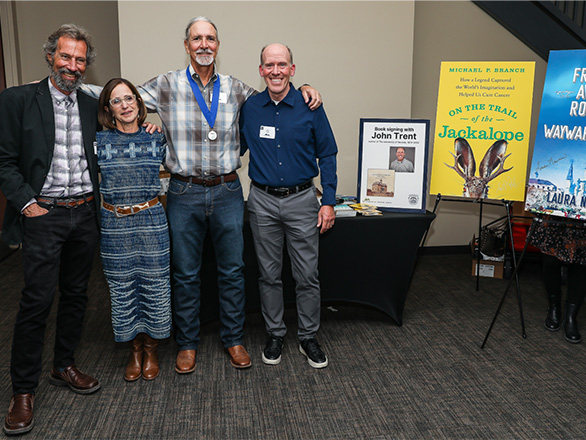
Building Operations
Streamlining in-house event services process
In collaboration with the University's Scheduling Services department, Libraries' Building Operations completed implementing and troubleshooting a software upgrade that streamlined the in-house event services process, and increased student access via converting the web reservation system to campus wide one-stop shopping for study spaces in the Libraries and elsewhere on campus.
Building Operations also completed an inventory of event service supplies, to refresh and enhance event services available to users.
DeLaMare Science & Engineering Library (DLM)
Integrating maker competencies, literacies into University curriculum
The DLM team presented on GIS and Data resources and services, as well as how to best integrate Makerspace services into different semester-long group projects for the Department of Geography's Design Studio course in Spring 2024. The team also connected a student group on campus with the Makerspace for a project the group was working on, which was to create an Arduino counter to survey users on the Pyramid Bike Trail.
The team promoted maker literacies at a few different Early Career Academic Faculty (ECAF) events, including "Mingle and Make" and ECAF lightning talks, leading to the successful integration of maker technologies into courses such as CHEM 432/435, ENGR 100, and ART 100/103.
Facilitating dissertation writing workshop
The Libraries' Data Services Coordinator collaborated with the Writing and Speaking Center, the Graduate Student Association, and the Graduate School to offer the first dissertation writing workshop, a three-day event that took place at the Lake Tahoe campus. It brought together 21 doctoral students from diverse disciplines and included workshops on numerous topics. Members of this first participant cohort continued to meet on campus as an accountability writing group. The goal of this program is to support doctoral students' timely progression toward degree completion.
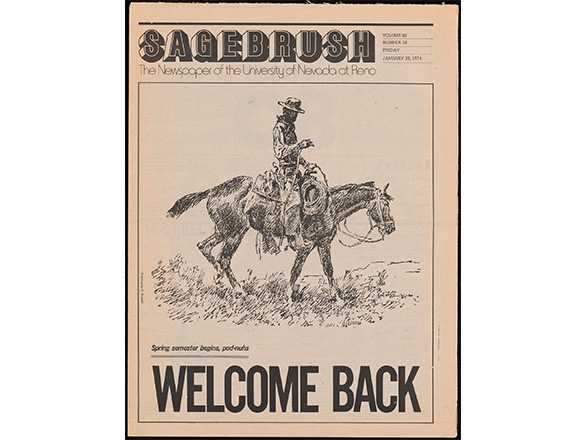
Digital Services
Keeping infrastructure up-to-date and functioning
The Libraries' Digital Services department documented its critical infrastructure and developed a change management process for keeping infrastructure up-to-date and functioning. A full inventory of the department's applications, stakeholders, and support systems was completed. The department also studied and implemented the use of two Al technologies in pilot programs to enhance efficient and equitable access to digital collections.
Publishing digitized campus publications
The department published digitized campus publications including the Nevada Sagebrush newspaper and Artemisia yearbooks to ensure easy access to the history of student life at the University of Nevada, Reno.
All issues of the Nevada Sagebrush up to 1979 were digitized and published in the University Libraries' Digital Archive.
Research and Instructional Services (RIS)
Promoting Open Educational Resources
The Libraries' RIS department grew and assessed the Open Educational Resources Faculty Professional Development Grant program with a focus on large-enrollment courses in order to increase the number of students who benefit. In 2024, the department enrolled 10 additional University faculty in the grant program and assessed the first two years of the program.
Supporting dual enrollment
RIS provided teaching and learning support for high school students, teachers, and librarians participating in the University's Dual Enrollment program. Communications channels were established with on-campus directors, supporting instructors, high school teachers and high school librarians in the Spring of 2024.
Dual enrollment students have the same access to materials and services as on-campus students. One librarian received an LSTA grant from the State of Nevada to train high school librarians and media specialists who support dual enrollment students in all locations, including Clark County. The librarian connected with 35 librarians or functional staff at 36 Collegiate Academy schools and sends them an informative newsletter each semester.
Special Collections and University Archives (SCUA)
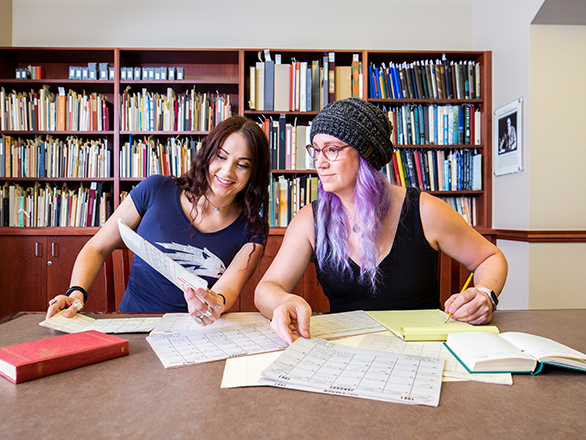
Integrating primary source literacy into SCUA instruction
The Libraries SCUA department integrated primary source literacy into its instruction by more closely collaborating with RIS. They also used the Guidelines for Primary Source Literacy developed by the Association of College and Research Libraries (ACRL), the Rare Books and Manuscript section of ACRL, and the Society of American Archivists. The team developed a report on how current SCUA instruction services align with the ACRL/RBMS/SAA guidelines. Findings were shared within SCUA as well as RIS to identify points of overlap. Furthermore, the Outreach and Public Services Archivist revamped the instruction program by creating lesson plans that are directly aligned with primary source literacy guidelines. The Archivist now regularly participates in liaison meetings with RIS librarians to share information.
Assessing how SCUA materials can support broader Open Educational Resource efforts
SCUA partnered with the Libraries' MCOTA department to clearly label Special Collections' digital content with accurate rights and licensing information and also established a process wherein public domain status is updated each year.
Creating an instruction services webpage
SCUA now has a dedicated webpage, launched in Spring 2024, covering the details related to Special Collections' instruction services. The webpage contains information related to instruction, with a custom instruction request form. In addition, the general SCUA website was revised to include additional instructional support information.
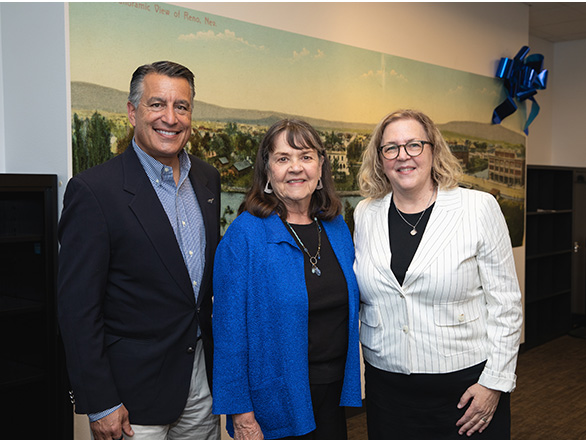
Vault Studio Classroom: a rare gem in academia
Located on the first floor of the Mathewson-lGT Knowledge Center, the Vault Studio is a remarkable new classroom addition to the academic community at the University. Opened at the start of the fall 2024 semester, it is a dedicated space where learning transcends the traditional boundaries of SCUA's reading room. The Vault Studio provides students, faculty, and the broader community with an opportunity to gain unparalleled access to primary sources from the Archives.
The classroom comfortably accommodates 36 students with 18 tables. One of the major instructional tools in the space includes a cutting-edge, ceiling-mounted, high-tech document camera. This new camera enables SCUA to teach with the vast majority of materials in its collection - large or small format.
The Libraries extends its deepest gratitude to Frankie Sue Del Papa and the Greg Nelson - Warren Nelson Family for providing the funding needed to make The Vault Studio possible.